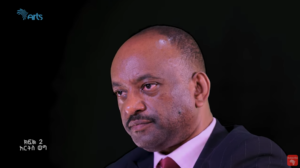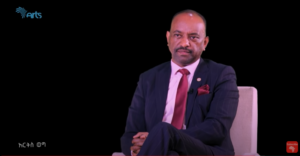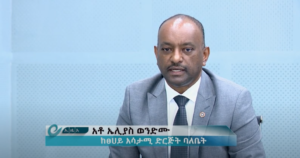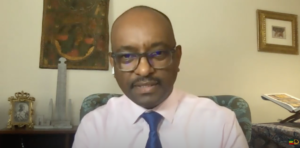ABIYA MAGAZINE – Now more than ever knowledge, information, and what we hold to be true have become so malleable by media and historical truths. Most times, our identities are shaped by certain perceptions of knowledge through books, articles, and societal and cultural norms. Storytelling through black ownership and creation is becoming significant, prominent, and incredibly important in the space of media, publication, and cultural influence. Elias Wondimu finds himself at the realm of purpose and responsibility as the creator and founder of the only Black-owned-and-operated university press in the United States and Europe. Tsehai Publishers has “become the intellectual hub for the creation and sharing of knowledge about Africa and beyond, as it relates to history and culture.” He and his staff focus on the rejection of boundaries in order to seek untold stories that inform the public through various mediums, primarily their print publications but also through conferences, forums, screenings, and lectures.
 Elias’ personal narrative is interwoven within the purpose of Tsehai. As an Ethiopian native, his proximity to understanding glaring mis-told stories of his country and Africa altogether were discouraging. “I had always been passionate about Ethiopian and African issues and quickly realized that books on both were few and scattered among various publishers, some of which served to simply perpetuate ignorance.” Elias found it frustrating that the limited resources available to Africans were poorly circulated, pushing him to create an institution that would provide younger generations with necessary information of their history and culture.
Elias’ personal narrative is interwoven within the purpose of Tsehai. As an Ethiopian native, his proximity to understanding glaring mis-told stories of his country and Africa altogether were discouraging. “I had always been passionate about Ethiopian and African issues and quickly realized that books on both were few and scattered among various publishers, some of which served to simply perpetuate ignorance.” Elias found it frustrating that the limited resources available to Africans were poorly circulated, pushing him to create an institution that would provide younger generations with necessary information of their history and culture.
Although his concerns about the creation and circulation of thoughtful and accurate African history and culture weighed on him, he initially grew up wanting to become a medical doctor. During the political change in Ethiopia in the early 1990s, from a Marxist regime to a Democratic government, this changed his outlook on the world and redirected him to pursue journalism. “It is through my work as a journalist that I learned how our larger community is affected due to a lack of media institutions representing it in this globalized world.”
Across cultures and societies, we may find it difficult to pursue our passions and take risks that others may find out-of-the ordinary or abnormal to the status quo, especially in a Western world built on capitalism. As Elias was set to pursue his path of becoming a doctor, life found a way of pushing him to what fulfills him most. “I believe in the power of knowledge, the importance of information, and the need for more proponents of social justice. The projects I pursue are navigated with those things in mind.” Thus Tsehai became Elias’ haven, encapsulating those very attributes.
Tsehai means “the sun” in Amharic, the national language of Ethiopia. But more significant to Elias personally, it was the name of his mother. “She passed away three years after I left Ethiopia, so in many ways this is my homage to her.” The personal and cultural significance behind his brand embody the importance of individual purpose and communal responsibility in his work and life. He explains that the logo of Tsehai (a sun, a moon, and book) serves to represent enlightenment, which is dependent on knowledge and the proliferation of information. “The faces depicted on the sun/moon are actually modeled after traditional Ethiopian church paintings that speak not only to the importance of culture/customs and history, but to the importance of having knowledge created by the people it is intended for.” Elias is attentive and his emblem that represents Tsehai is crafted to depict the platform that the company holds; the sun and moon cross to represent yin and yang where he explains that through this dichotomy, knowledge shines and information that matters illuminates and lives.
Like any start-up company, Elias described the difficulty of establishing his business from the ground up. “Since I could not secure any financing, I had to max out both my credit cards and cash out my 401K with a big penalty.” Looking back, he realized the risk it took to create a publishing company at a time when traditional books were on the verge of dying out as a new wave of digital media was on the rise. In conjunction, his company focused on Ethiopia and Africa, topics that were and still are easily overlooked, so for him it was a large risk that most wouldn’t have taken. “But I didn’t care and I was willing to sacrifice everything for the dream of creating a vehicle that would help correct the stereotypes that have become the norm in our modern society.”
Tsehai publishes content that informs social justice issues through multiple art forms, whether it is academic, creative, film, and so forth. Elias and the entire team at Tsehai work to make a commitment to underserved community of writers in order to create a more socially conscious world. TSEHAI’s initial focus was solely on Ethiopia, however, Elias explained that it has grown to publish books on all aspects of local and international affairs, history, culture, and politics. “It is an umbrella for various imprints, so there are multiple presses that it houses and which are editorially independent and individually focused.” Tsehai Publishers includes the African Academic Press, the Marymount Institute Press, and Chereka Books; most recently the Harriet Tubman Press was cultivated in order to provide a space for books on the historical, present, and future issues of African Americans. The erasure of blackness is a global issue and with this addition to the Tsehai family, it reminds everyone the importance and significance of black storytelling from all countries and perspectives, illuminating the vastness of our narratives.
Elias wishes to expand Tsehai to become more accessible and usable. Knowledge comes in many forms: writing, visual, music, and verbal communication, something that dates back to generational traditions of passing down stories within the history of our African culture. Elias is open to many new ways of bringing his vision to as many people as he can; digital, visual, and so on.
I asked him what it meant for him to produce such enriching content that is often neglected and wrongly told; he told me it means power. “Power to liberate people and nations from an oppressive and colonialist mindset and representation imposed upon them. In proliferating knowledge created by, for, and about members of a given marginalized community, we can work towards projecting a voice that has been historically and continuously silenced or controlled.”
Today, our world stands in a place of civil unrest, in the United States, in Ethiopia, in every continent; we find it harder than ever to find justice and liberating knowledge. The current climate in Ethiopia makes Tsehai’s work all the more significant and important to circulate to readers across the world, eradicating misconceptions in order to understand current events. Elias emphasizes the current situation in Ethiopia is predicated on events dating back the last century, furthering his belief that with proper knowledge of history, long lasting solution can result. He and his team strive to re-shape the world and most importantly help people (un)learn about themselves and others, shining and illuminating the accurate truths of our history and culture.
SOURCE: By Beza Fekade, Ayiba Magazine (Nov 10, 2016)






